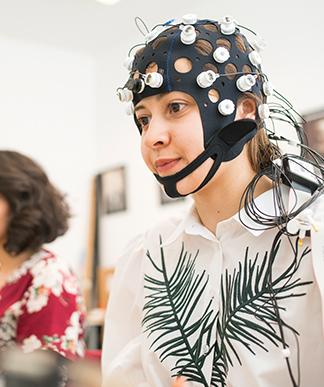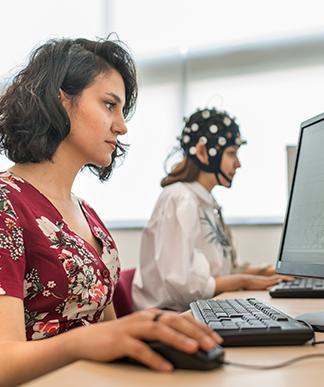


About the Department
The CIU Department of Psychology established in 2010, under the Faculty of Arts and Sciences, with the approval of the Higher Education Council (YÖK) in Turkey. During the first three years, the medium of instruction for the undergraduate program was entirely English; however, in 2013, the Turkish program was opened and began training and educating prospective psychologists who prefer to study in this rapidly growing field. The main objectives of the undergraduate program are to teach courses in general psychology as well as the various sub-fields of psychology including social psychology, developmental psychology, experimental psychology, industrial psychology, cognitive psychology and clinical psychology and to provide basic knowledge in psychology; to teach scientific thinking skills and academic research techniques; to adhere to professional ethical principles and practice; and to train psychologists with advanced communication skills.
Accreditations
The Psychology Program has been since February 2018, by the Association for the Evaluation and Accreditation of Science, Literature, Science-Literature, Language and History-Geography Faculties Education Programs (FEDEK), which is a leading accreditation body in Turkey known for its innovative and continuous development in accreditation. The rapidly growing and developing Psychology Department at CIU received its well-deserved accreditation (FEDEK) in December 2017 for 5 years. Moreover, the CIU Department of Psychology is the only psychology department in the TRNC that has obtained this accreditation and it is also among the very few departments accredited throughout Turkey.
Education Opportunities
Our undergraduate and graduate programs are designed to provide students with advanced theoretical, empirical, and methodological knowledge in specific fields of psychology while providing them with opportunities to apply and integrate this knowledge into their areas of expertise. Students equipped with this foundation are anticipated to either pursue an academic career or to work in the field as either practitioners or researchers.
Our state of the art neuropsychology lab, which is the first and only neuropsychology lab in the TRNC, is fully equipped (from neuropsychological test batteries to EEG) and open for public service. In our neuropsychology lab, research topics such as memory, executive functions, cognitive development, and neuropsychological assessments are of priority. Studies carried out in the lab are done with students assigned to the projects and are supervised by the department's experienced academics. Additionally, students are encouraged to develop and carry out research projects in their field of interest, also supervised by academics in the department.

Career Areas
Psychology graduates can work as psychologists in all areas that interact with people, such as clinics, hospitals, educational institutions, and in administrative positions at housing and day-care centers or nursing homes, in organizations focusing on increasing work-place productivity and the well-being of employees, and in professional sports and athletics areas in order to improve the performance of the responsible athletes and sports clubs. Graduates can become psychologists, researchers, guidance teachers, management psychologists, or work in forensic institutions, family courts, criminal courts, psycho-evaluation centers, corporations, and human resources departments. Also, they can seek out careers in public relations or management units, public organizations, advertising companies, copywriting departments and/or work as private consultants. Graduates who are interested in becoming researchers, teaching assistants, or working in academia can pursue their master’s degree and/or Ph.D. Moreover, graduates who are interested in working in a clinical and practical setting are also obliged and encouraged to pursue their master’s degree in a related program. Finally, they then can set up their own consulting and training companies or offer a variety of services to businesses on personnel selection and training.
Contact
Faculty of Arts and Sciences
Education and Humanities Center, EH113
Tel: +90 392 671 1111 Extension: 2601
Faculty E-mail: secretary-fas@ciu.edu.tr
Compulsory Courses
First Semester
BIOLOGY-I
Course code
BIOL103Credit
3Theoretical
3Practical
0Ects
4READING AND WRITING SKILLS-I
Course code
ENGL141Credit
3Theoretical
2Practical
2Ects
4INTRODUCTION TO COMPUTERS
Course code
ITEC110Credit
3Theoretical
2Practical
2Ects
4GENERAL PSYCHOLOGY-I
Course code
PSYC101Credit
3Theoretical
3Practical
0Ects
6SOCIOLOGY
Course code
SOCY101Credit
3Theoretical
3Practical
0Ects
5BASIC STATISTICS-I
Course code
STAT105Credit
3Theoretical
2Practical
2Ects
5TURKISH LANGUAGE
Course code
TREG100Credit
0Theoretical
2Practical
0Ects
2TURKISH
Course code
TURK100Credit
0Theoretical
2Practical
0Ects
2Second Semester
BIOLOGY-II
Course code
BIOL108Credit
3Theoretical
3Practical
0Ects
5READING AND WRITING SKILLS-II
Course code
ENGL142Credit
3Theoretical
2Practical
2Ects
4INTRODUCTION TO PHILOSOPHY
Course code
PHIL102Credit
3Theoretical
3Practical
0Ects
4GENERAL PSYCHOLOGY-II
Course code
PSYC102Credit
3Theoretical
3Practical
0Ects
6SOCIAL ANTHROPOLOGY
Course code
SOCY106Credit
3Theoretical
3Practical
0Ects
6BASIC STATISTICS-II
Course code
STAT106Credit
3Theoretical
2Practical
2Ects
5Third Semester
ADVANCED READING AND WRITING SKILLS-I
Course code
ENGL241Credit
3Theoretical
2Practical
2Ects
4HISTORY OF CIVILIZATION
Course code
HIST100Credit
0Theoretical
2Practical
0Ects
2SOCIAL PSYCHOLOGY-I
Course code
PSYC201Credit
3Theoretical
3Practical
0Ects
6DEVELOPMENTAL PSYCHOLOGY-I
Course code
PSYC203Credit
3Theoretical
3Practical
0Ects
6RESEARCH METHODS IN PSYCHOLOGY-I
Course code
PSYC205Credit
3Theoretical
3Practical
0Ects
6DATA ANALYSIS-I
Course code
STAT207Credit
3Theoretical
2Practical
2Ects
6MODERN TURKISH HISTORY
Course code
TARH100Credit
0Theoretical
2Practical
0Ects
2Fourth Semester
ADVANCED READING AND WRITING SKILLS-II
Course code
ENGL242Credit
3Theoretical
2Practical
2Ects
4DEVELOPMENTAL PSYCHOLOGY-II
Course code
PSYC204Credit
3Theoretical
3Practical
0Ects
7RESEARCH METHODS IN PSYCHOLOGY-II
Course code
PSYC206Credit
3Theoretical
3Practical
0Ects
8AREA ELECTIVE
Course code
PSYCXX1Credit
3Theoretical
3Practical
0Ects
6DATA ANALYSIS-II
Course code
STAT208Credit
3Theoretical
2Practical
2Ects
5Fifth Semester
PSYCHOPATHOLOGY
Course code
PSYC301Credit
3Theoretical
3Practical
0Ects
6EXPERIMENTAL PSYCHOLOGY
Course code
PSYC305Credit
3Theoretical
3Practical
0Ects
6ETHICS IN PSYCHOLOGY
Course code
PSYC307Credit
3Theoretical
3Practical
0Ects
6PHYSIOLOGICAL PSYCHOLOGY
Course code
PSYC309Credit
3Theoretical
3Practical
0Ects
6AREA ELECTIVE
Course code
PSYCXX2Credit
3Theoretical
2Practical
2Ects
6Sixth Semester
PERSONALITY
Course code
PSYC302Credit
3Theoretical
3Practical
0Ects
6INDUSTRIAL PSYCHOLOGY
Course code
PSYC304Credit
3Theoretical
3Practical
0Ects
5COGNITIVE PSYCHOLOGY
Course code
PSYC306Credit
3Theoretical
3Practical
0Ects
6NEUROPSYCHOLOGY
Course code
PSYC308Credit
3Theoretical
3Practical
0Ects
7AREA ELECTIVE
Course code
PSYCXX3Credit
3Theoretical
3Practical
0Ects
6Seventh Semester
CLINICAL PSYCHOLOGY
Course code
PSYC401Credit
3Theoretical
3Practical
0Ects
8HEALTH PSYCHOLOGY
Course code
PSYC403Credit
3Theoretical
3Practical
0Ects
8AREA ELECTIVE
Course code
PSYCXX4Credit
3Theoretical
3Practical
0Ects
6UNIVERSITY ELECTIVE
Course code
UNIEXX1Credit
3Theoretical
3Practical
0Ects
4UNIVERSITY ELECTIVE
Course code
UNIEXX2Credit
3Theoretical
3Practical
0Ects
4Eighth Semester
INTRODUCTION TO PSYCHOTHERAPEUTICAL TECHNIQUES
Course code
PSYC408Credit
3Theoretical
2Practical
2Ects
10AREA ELECTIVE
Course code
PSYCXX5Credit
3Theoretical
2Practical
2Ects
6AREA ELECTIVE
Course code
PSYCXX6Credit
3Theoretical
3Practical
0Ects
6UNIVERSITY ELECTIVE
Course code
UNIEXX3Credit
3Theoretical
3Practical
0Ects
4UNIVERSITY ELECTIVE
Course code
UNIEXX4Credit
3Theoretical
3Practical
0Ects
5Elective Courses
TR Applicants
TR Students who are successful in the exams conducted by the Higher Education Council Student Selection and Placement Center (ÖSYM) and are entitled to enroll in our university in line with their preferences can complete the registration process with the necessary documents for registration from our Registration and Liaison Offices throughout Turkey or from the Marketing Directorate on campus.
Click for detailed admission requirements information.
TRNC Applicants
TRNC citizens and TR citizen candidate students who have completed their entire high school education in TRNC. They are placed in undergraduate programs in line with their success in the CIU Student Placement and Scholarship Ranking Exam and the programs they prefer.
Students who are successful in the exam can register from the TRNC Marketing Office.
Applicants can directly apply online to our undergraduate programs using the application portal. Please fill in your details correctly and upload all the required documents listed on the last page of the application form.
Required documents;
- Completed application form,
- Higher/Secondary Certificate or equivalents (e.g. O/A’Level, WAEC/NECO),
- Evidence of English Language competence: TOEFL (65 IBT) or IELTS (5.5). Students without these documents will take the CIU English proficiency exam on campus following arrival,
- Scanned copy of international passport/birth certificate,
- Fully completed and signed CIU Rules and Regulations document (which can be downloaded during the online application).
Cyprus International University provides academic scholarships for its students as an incentive for success, with most students benefiting from 50%, 75% or 100% scholarships or discounted tuition fees. Click for more information.
| Non-Scholarship | 50% Scholarship | |
| Undergraduate Programs | € 5.843,00 | € 3.099,00 |
Click for more to learn about fees in line with the Tuition Fee Calculation system.
PO1: Critically evaluate the importance of a multidisciplinary approach to advancing science, knowing the subfields of psychology, understanding the relationship between psychology and other sciences in scope and methods, reaching specific definitions and explanations, and being in relationship with different sciences.
PO2: Define the theoretical and practical knowledge of current psychology, to make conclusions from them, to analyze them, to synthesize them by synthesis, to compare and criticize the information.
PO3: Describe scientific approaches and methods and techniques of psychology, express them in their own words, analyze researches in terms of approaches, methods and techniques, compare and criticize them in terms of advantages and disadvantages, anticipate and control research mistakes and / decide which methods and techniques to apply in field studies, analyze and criticize the implications of this decision.
PO4: Apply logical, intuitive and creative thinking skills, special field skills and key skills (transferable skills) to complete tasks and solve problems.
PO5: Prepare, manage, analyze, draw conclusions and use the results to apply research and field project to knowledge, skills and competencies.
PO6: The processes of learning knowledge and competence, self-recognition and control, self-criticism, protection of mental health, and awareness of the problems in this context; tolerance of individual differences, empathy, understanding others and using them in healthy communication.
PO7: Use the knowledge, skills and competencies individually and within the team, to make plans that include the members of the team under their responsibility and to guide them in the direction of their goals and objectives.
PO8: Know how to use knowledge and skills effectively in business and work environments, professional and personal development issues, to be able to demonstrate the competences that are exhibited autonomously in personal and social responsibility consciousness.
PO9: To be able to perform competence, interpersonal communication, social competence, professional and professional competence.
PO10: Understand that life-long learning is the subject of knowledge, skills and competencies acquired in the context of development and change, that the existing ones will be developed and reorganized, that they will be optimized, and that they will be able to follow innovations.
PO11: Share the knowledge, skills, competencies and attitudes of human psychology on a sectorial, national and international basis, verbally or in writing, with the support of quantitative and qualitative data when necessary.
PO12: To be able to research, practice and publish in the field of psychology, to behave in line with ethical principles, to show a critical approach in ethics.
PO13: To be able to use information and communication technologies for information acquisition, analysis, interpretation and dissemination.
PO14: To track developments related to psychology on a foreign language, using this language to contribute to international understanding.
PO15: To prepare professional records and research results in the form of scientific texts and in line with the rules of ethics and to present them to the evaluation of the press organs.
PO16: To be able to understand, explain, analyze and interpret social events and events, and to be able to demonstrate awareness of individual and social differences in behavior.
PO17: Ability to use knowledge, skills and competencies in accordance with the vision and mission of the Cyprus International University.
PO18: To be able to use knowledge and skills in psychology, accordingly with Atatürk's principles and revolutions and the dynamics of contemporary Turkish society to be able to analyze and evaluate them.
PEO1: To have basic theoretical knowledge about psychology,
PEO2: Being able to use the findings of psychology in applied fields,
PEO3: Being able to propose new research questions about psychology and carry out scientific projects related to these questions,
PEO4: To have the ability to work collaboratively with professionals from different disciplines,
PEO5: To have the ability to think critically and produce creative solutions in professional life,
PEO6: To have knowledge about the ethical principles related to the profession of psychology and to raise students who have the ability to apply these principles.